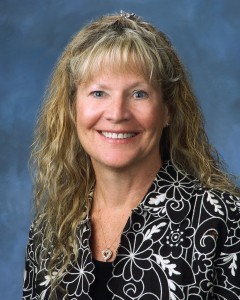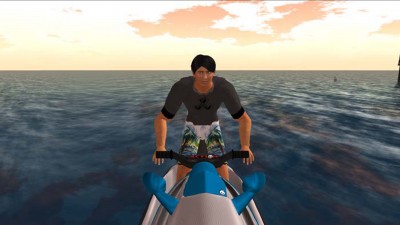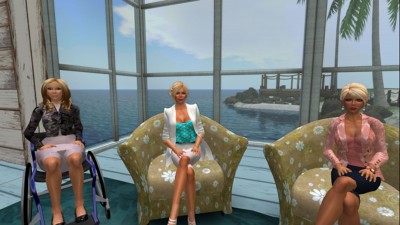NSU Newsroom
SharkBytes
Horizons
This version of NSU News has been archived as of February 28, 2019. To search through archived articles, visit nova.edu/search. To access the new version of NSU News, visit news.nova.edu.
This version of SharkBytes has been archived as of February 28, 2019. To search through archived articles, visit nova.edu/search. To access the new version of SharkBytes, visit sharkbytes.nova.edu.
Nova Southeastern University Researcher Receives $1 Million Grant to Develop Virtual World Program to Support Amputees

Sandra Winkler, Ph.D., faculty researcher and assistant professor for the Nova Southeastern University College of Health Care Sciences
FORT LAUDERDALE-DAVIE, Fla.- Some people use alternate virtual world programs like Second Life® to escape reality, but one researcher is examining whether these same virtual worlds that are used to stimulate the imagination could help amputees develop the skills needed to navigate the real world.
Sandra Winkler, who has a Ph.D. in rehabilitation science and serves as a faculty researcher and assistant professor for the Nova Southeastern University College of Health Care Sciences Department of Occupational Therapy, was recently awarded a three-year grant totaling nearly $1 million in funding from the U.S. Department of Health & Human Services Agency for Healthcare Research & Quality to pursue her study. The project costs will be 100% financed with federal funds.
Winkler’s research titled “Dissemination of Amputation and Prosthetic Evidence-based Medicine (DAP-EM)” will translate into educational and supportive programs for amputees to benefit amputees functionally and psychologically and potentially help reduce “phantom limb pain” which commonly occurs in amputees as a result of the trauma they experienced.
“Patients will be able to enter our virtual island and simulate what it is like to once again use their missing limbs,” said Winkler. “This has the possibility to make life better for so many amputees, and all they will need is an Internet connection.”

Amputees will be able to virtually experience activities like riding on a jet ski through this research study
Participants in the study will be able to virtually experience everything from riding on a jet ski to diving in a coral reef. The virtual world will also include a historical tour of prosthetics, educational seminars, and a forum for participants to anonymously meet and discuss common issues and challenges they face in the real world. They will even be able to “test” different prosthetic models in a virtual shop, allowing them to gain a sense of different types of devices and determine what may be the best for them.

Avatars of the research team in an area of the private Second Life® island where amputees will be able to meet virtually as part of the study
“It is our hope that this project will not only support the amputees, but support clinicians and caregivers by allowing them to simulate and learn more about life as an amputee,” said Winkler. “This research can eventually be translated to help individuals with other chronic conditions.”
Doctoral students from NSU will also be a part of the research, including working with military spouses in a virtual world environment and helping amputees plan home modifications using a virtual home.
There are currently approximately 2 million people living with limb loss in the United States, according to the National Limb Loss Information Center. This number is projected to increase to 3.6 million by 2050. Approximately 185,000 amputations occur in the United States each year. The expected lifetime costs of veterans with amputations ranges from $1.4 to $1.8 million, not including surgery or future technologies.
For more information about this study, please visit www.virtualhealthadventures.org.
###
About NSU’s College of Healthcare Sciences (CHCS): The CHCS strives to provide professionals with the skills necessary for the diagnosis, treatment and prevention of disease and disability in order to assure optimum health conditions in the community and beyond. With an unwavering commitment to ethical practice and in support of NSU’s Core Values, the college endeavors to advance research, scholarship, and the development of leadership skills utilizing traditional educational methods, distance learning, and innovative combinations of both to achieve its educational goals. For more information, please visit http://www.nova.edu/chcs.
About Nova Southeastern University: Situated on 314 beautiful acres in Ft. Lauderdale, Florida, Nova Southeastern University (NSU) is a dynamic fully accredited research institution dedicated to providing high-quality educational programs at all levels. NSU is a not-for-profit independent institution with 27,000 students. NSU awards associate’s, bachelor’s, master’s, specialist, doctoral and first-professional degrees in a wide range of fields. NSU is classified as a research university with “high research activity” by the Carnegie Foundation for the Advancement of Teaching, and it is one of only 37 universities nationwide to also be awarded Carnegie’s Community Engagement Classification. For more information, please visit www.nova.edu.
Media contact:
Jeremy Katzman, M.B.A. | Office of Public Affairs
954-262-5408 (office)
954-661-7000 (cell)
j.katzman@nova.edu